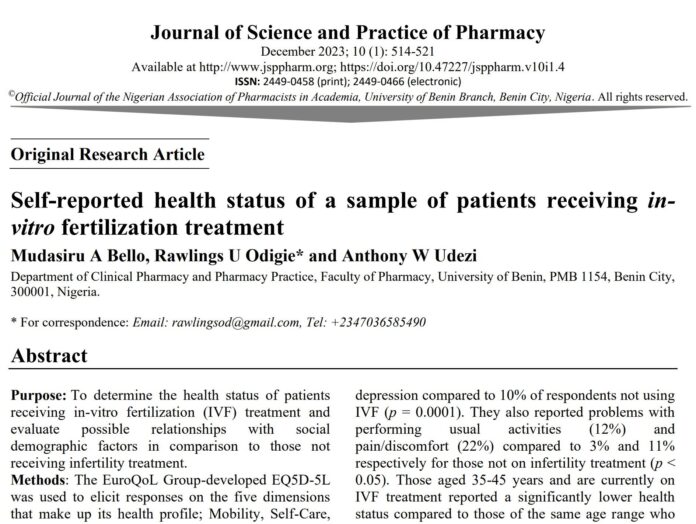February 2024: Paper of the Month by Bello et al., 2023 – Self-reported health status of a sample of patients receiving in-vitro fertilization treatment.
An article by Bello, et al., (2023) titled “Self-reported health status of a sample of patients receiving in-vitro fertilization treatment” published in the Journal of Science and Practice of Pharmacy (J Sci Pract Pharm) an official publication of the Nigerian Association of Pharmacists in Academia, University of Benin Branch reports that infertility and its treatment through in-vitro fertilization (IVF) pose significant challenges to individuals and couples worldwide. Understanding the health implications of infertility and IVF treatment is crucial for providing effective support and care to patients undergoing such treatments. A recent study conducted in Nigeria sheds light on this important issue, utilizing the EQ-5D-5L instrument to measure health-related quality of life among IVF patients and comparing it with those not receiving infertility treatment.
“
Infertility and IVF affects quality of life and the domain mostly affected is anxiety and depression– Bello, et al., 2023
How the study was conducted
The study, conducted in Abuja, Nigeria, employed a rigorous methodology to assess the impact of infertility and IVF treatment on health status. The EQ-5D-5L questionnaire was utilized to measure five dimensions of health: mobility, self-care, usual activities, pain/discomfort, and anxiety/depression. Additionally, a visual analogue scale (VAS) was used to rate overall health status. Data were collected from 385 respondents meeting inclusion criteria, including those undergoing IVF treatment and those not using IVF. Statistical analyses, including t-tests and chi-square tests, were employed to examine relationships between health status, IVF treatment, and sociodemographic factors.
What the authors found
The study revealed several key findings regarding the impact of infertility and IVF treatment on health status:
- Decreased Health Status: Infertility and IVF treatment were associated with reduced quality of life, particularly in domains such as anxiety/depression, pain/discomfort, and usual activities.
- Socio-Demographic Influences: Various socio-demographic factors including age, gender, marital status, occupation, and education level were found to influence health status among respondents. For instance, older individuals, females, married respondents, and those with lower education levels reported lower health status.
- Psychological Distress: Anxiety/depression emerged as the most affected domain, with a significant proportion of IVF patients reporting problems in this area. This highlights the psychological burden associated with infertility and IVF treatment, necessitating increased support and mental health services for affected individuals.
Why is this important
The study’s findings have several implications for clinical practice, policy-making, and patient support:
- Psychological Support for IVF Patients: Given the negative impact of IVF treatment on mental well-being, there is a pressing need for psychological support services for IVF patients to address emotional distress and improve coping mechanisms.
- Marital Support and Communication: Infertility and IVF treatment affect not only the patients themselves but also their partners and marital relationships. Couples undergoing IVF may benefit from open communication, mutual support, and access to marital counseling services.
- Tailoring IVF Services: Understanding the role of socio-demographic factors in IVF outcomes can help tailor services to meet the diverse needs of different patient populations. Providers should consider socio-economic backgrounds when designing and delivering IVF services.
What the authors recommend
- Mental health support: Infertile couples, especially those receiving IVF treatment, may benefit from psychological counseling and social support to cope with the stress and emotional burden of infertility and its treatment. This may improve their quality of life and well-being.
- Public awareness and education: There is a need to raise public awareness and educate people about the causes, consequences, and treatments of infertility, as well as to reduce the stigma and discrimination associated with it. This may help infertile couples to seek timely and appropriate care and to access available resources and services.
- Health system strengthening: The health system should provide adequate and affordable infertility services, including IVF treatment, to meet the needs and preferences of infertile couples. The health system should also monitor and evaluate the quality and outcomes of infertility care, including the health status and quality of life of patients.
In conclusion, this study underscores the complex interplay between infertility, IVF treatment, and health status, emphasizing the need for comprehensive support services to address the physical, emotional, and relational challenges faced by individuals and couples navigating infertility and assisted reproductive technologies.

















 The African Research (AR) Index is a comprehensive scholarly directory and database focused explicitly on journal publishers that publish and disseminate African research.
The African Research (AR) Index is a comprehensive scholarly directory and database focused explicitly on journal publishers that publish and disseminate African research.

